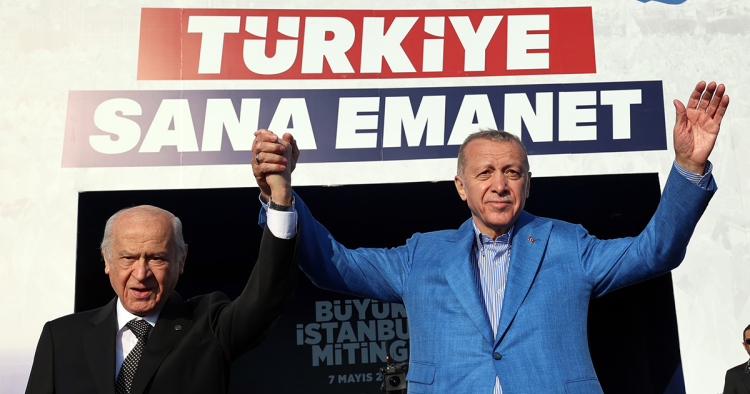MEI's Turkish Election Watch series, a weekly update on the latest developments about Turkey's upcoming presidential and parliamentary vote, will run until the conclusion of the elections in May.
The Turkish elections are now less than 10 days away and the atmosphere has become increasingly heated. The ruling coalition, in particular, seems to be feeling the heat and its rhetoric has become notably more intense in recent days.
More signs of opposition strength
The opposition, led by Nation Alliance presidential candidate and Republican People’s Party (CHP) head Kemal Kılıçdaroğlu, has been honing its message and showing continued signs of strength. If many had fretted that his broad coalition would break apart under the pressure of campaigning, it has not done so. Kılıçdaroğlu visited the Justice and Development Party (AKP) stronghold of Van in eastern Turkey this past week and was greeted by enthusiastic crowds. Most of that warm response was likely from the city’s large Kurdish population, who seem to have, by and large, decided that they want the “change” candidate. The fact that the jailed former leader of the pro-Kurdish Peoples’ Democratic Party (HDP), Selahattin Demirtaş, made his support for Kılıçdaroğlu explicit this week is another sign that Turkey’s sizeable Kurdish population will largely vote for the opposition this year.
On Sunday, May 7, the campaign visit of charismatic Istanbul opposition mayor Ekrem İmamoğlu to Erzurum was cut short when government supporters stoned the mayor’s campaign bus. İmamoğlu blamed the police and governor (selected by the central government) for failing to intervene in the attack. Such attacks by government supporters — and often condoned by the security services — have been a periodic element of other recent election campaigns in Turkey.
Kılıçdaroğlu also made clear this week that Ali Babacan would take a leading role in guiding the economy should the opposition win. Babacan is currently the leader of the tiny Democracy and Progress Party (DEVA), one of the smaller partners in the opposition’s “Table of Six” coalition. Highlighting his role, however, would reassure a number of different constituencies. Firstly, and perhaps most importantly, it helps make the case that the opposition is Turkey’s best bet for righting the country’s rocky economy. Investors looking to the future, and desperate business people and families trying to survive to month’s end, may recall the positive role that Babacan played in the AKP’s “growth years,” when he served as minister for the economy and, later, as foreign minister. Babacan is generally well regarded, both abroad and within the business community; his prominence helps to reassure voters that the opposition can fix an economy that is quite clearly badly mismanaged.
Moreover, Babacan’s former role as an AKP luminary helps to underline that the opposition is not anti-Muslim, or particularly interested in settling scores. This is, of course, also true for some other members of the Table of Six, most notably Ahmet Davutoğlu and his small Future Party (GP) and the old-school Islamists of the Felicity Party (SP). Nonetheless, Babacan’s prominence is notable and counters the AKP’s efforts to portray the opposition as fundamentally antagonistic to religion. Babacan’s prominence helps to underline the role of devout Muslims within the opposition coalition and appeals to business people desperate for economic competence.
Perhaps the most effective moment for the opposition’s campaign this week came in the form of a short (four second!) video by Kılıçdaroğlu, speaking from his living room. I quote it here in full: “If you are poorer today than you were yesterday, the only reason is Erdoğan. Good night.” For an electorate that is struggling to make ends meet, this is the opposition’s best and most powerful message.
The ruling coalition takes off the gloves
Given the state of the economy and the opposition’s unexpected success in staying unified and on message, the ruling coalition has doubled down on nationalism and culture wars issues. Taking a lesson from Viktor Orban and Vladimir Putin, President Recep Tayyip Erdoğan has made the opposition’s purported support for LGBT rights a major talking point, calling them, literally “LBGTists” (LGBTçiler); what the average Turkish speaker makes of this neologism is anybody’s guess, but the intention is clear: to paint the opposition as out of touch with “national culture and values,” and, perhaps more specifically, as the stalking horse for foreign influence. Indeed, quite aside from the Turkish government’s attempts at resetting relations with its Western partners, anti-Western rhetoric — and especially anti-Greek and anti-U.S. language — has played an increasingly central role in the government’s campaign. Top government officials have also claimed, variously, that the opposition is aiming to bring the widely despised Gülen Movement back to power and that it is being directed from Kandil, which is to say the headquarters of the Kurdistan Workers’ Party (PKK).
More worryingly, government officials have started to make noises about whether an opposition victory could even be accepted. “My nation will not hand over this country to someone who becomes president with the support of Kandil,” said Erdoğan in one speech. His firebrand interior minister, Süleyman Soylu, has said that an opposition victory would be tantamount to an American-backed coup. Whether this is empty rhetoric or a dangerous sign of potential resistance to an opposition victory is, at this point, anybody’s guess. The risk, however, seems real.
Howard Eissenstat is a non-resident scholar with MEI's Turkey Program and an associate professor of history at St. Lawrence University, where he teaches courses on Middle East history and politics.
Photo by Turkish Presidency/Murat Cetinmuhurdar/Handout/Anadolu Agency via Getty Images
The Middle East Institute (MEI) is an independent, non-partisan, non-for-profit, educational organization. It does not engage in advocacy and its scholars’ opinions are their own. MEI welcomes financial donations, but retains sole editorial control over its work and its publications reflect only the authors’ views. For a listing of MEI donors, please click here.













